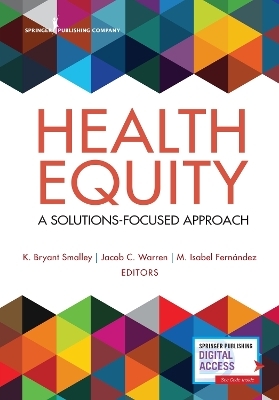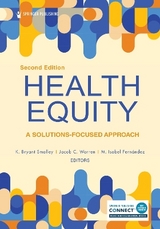
Health Equity
Springer Publishing Co Inc (Verlag)
978-0-8261-7723-0 (ISBN)
- Titel erscheint in neuer Auflage
- Artikel merken
Health Equity: A Solutions-Focused Approach is a comprehensive textbook that illustrates existing conditions of health disparities across a range of populations in the United States, positions those disparities within the broader sociopolitical framework that leads to their existence, and most importantly, presents specific ways in which health equity solutions can be designed and implemented. Presenting current theoretical foundations, cultural context, and evidence-based models and interventions all in one, this textbook provides students with the basis to achieve greater health equity in their communities. Edited by award-winning authors and featuring contributions from diverse experts in public health, sociology, psychology, and medicine, this groundbreaking text goes beyond a traditional approach to risk factors and disparities and emphasizes the central role that health equity initiatives must play in public health research and practice.
The book is divided into three sections, with Section I focusing on providing the context of health equity research and practice. Chapters are structured in such a way that both new and experienced students in the field will develop a deeper understanding of topics such as prejudice and discrimination; frameworks and theories; and research and collaboration approaches. Section II addresses the current knowledge of specific populations impacted by issues related to health equity, including African American, Latinx and Hispanic, Asian, American Indian and Alaska Native, Native Hawaiian and Pacific Islander, LGBTQ, Veteran, People with Disabilities, and many more. Authored or co-authored by members of the community being discussed, each of these chapters summarizes how health disparities impact the group, ongoing population-specific models of disparities and equity, emerging programs for achieving health equity, coverage of the most relevant aspects of intersectionality, and concluding exercises such as case studies and current events. Section III then highlights the role of cultural humility in achieving health equity. With its solutions-focused and community-affirming approach, Health Equity provides graduate and undergraduate students of public health with evidence-based models to help advance health through diversity, inclusion, and social justice.
Key Features:Origins and Theories – Discusses the sociocultural and political origins of health disparities and the major theories that underlie an understanding of health equity
Solutions-Focused – Describes emerging models and gives best practices in designing new programs
Diverse Population Coverage – Provides historical context, sociocultural dynamics, and population-specific evidence-based programs from the voices of the communities being discussed
Intersectionality Perspective – Highlights the role that overlapping and interdependent identities play in promoting health equity and the interventions that build from this perspective
Case Studies and Real-World Examples – Demonstrates how to apply health equity improvement approaches in different contexts
eBook access –Included with print purchase for use on most mobile devices or computers
Instructor’s Packet – With an Instructor’s Manual, PowerPoint slides, Test Bank, and a Sample Syllabus
K. Bryant Smalley, PhD, PsyD, MBA, is a licensed clinical psychologist and health equity researcher. He serves as the Associate Vice President for Research, the Wyoming Excellence Chair in Rural Health, and the Co-Executive Director of the Wyoming Rural Health Institute at the University of Wyoming, where he is also a Professor of Public Health. Jacob C. Warren, PhD, MBA, CRA, is a behavioral epidemiologist specializing in health equity research. He serves as the Co-Executive Director of the Wyoming Rural Health Institute and Professor of Public Health at the University of Wyoming. María Isabel Fernández, PhD, is a community psychologist whose health equity work focuses on substance abuse and HIV prevention and treatment in African-American and Hispanic populations. She is Professor Emeritus at the Kiran Patel College of Osteopathic Medicine at Nova Southeastern University (NSU).
Contributors
Preface
SECTION I: INTRODUCTION AND OVERVIEW
Chapter 1: Health Equity: Overview, History, and Key Concepts
Chapter 2: Prejudice, Discrimination, and Health
Chapter 3: Health Equity Frameworks and Theories
Chapter 4: Health Equity Research and Collaboration Approaches: CBPR, Mixed Methodologies,
and Collective Impact
SECTION II: POPULATION PERSPECTIVES ON HEALTH EQUITY
Chapter 5: African American Health Equity
Chapter 6: Health Equity in U.S. Latinx Populations
Chapter 7: Asian American Health Equity
Chapter 8: American Indian and Alaska Native Health Equity
Chapter 9: Health Equity for Kānaka ‘Ōiwi, the Indigenous People of Hawai‘i
Chapter 10: Women’s Health Equity
Chapter 11: Achieving Men’s Health Equity
Chapter 12: LGBTQ Health Equity
Chapter 13: Rural, Frontier, and Appalachian Health Equity
Chapter 14: Health Equity in Immigrant and Refugee Populations
Chapter 15: Health Equity in Veteran Populations
Chapter 16: Health Equity in Populations With Disabilities
Chapter 17: Achieving Health Equity for Children
SECTION III: THE PATH FORWARD
Chapter 18: The Role of Cultural Competence and Cultural Humility
in Achieving Health Equity
Chapter 19: The Future of Health Equity
Afterword: COVID-19 and Health Inequities
Index
| Erscheinungsdatum | 02.07.2020 |
|---|---|
| Zusatzinfo | 60 Illustrations |
| Verlagsort | New York |
| Sprache | englisch |
| Maße | 178 x 254 mm |
| Themenwelt | Studium ► Querschnittsbereiche ► Prävention / Gesundheitsförderung |
| Sozialwissenschaften ► Ethnologie | |
| Sozialwissenschaften ► Soziologie | |
| ISBN-10 | 0-8261-7723-9 / 0826177239 |
| ISBN-13 | 978-0-8261-7723-0 / 9780826177230 |
| Zustand | Neuware |
| Haben Sie eine Frage zum Produkt? |
aus dem Bereich



